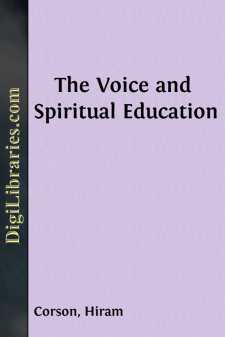Categories
- Antiques & Collectibles 13
- Architecture 36
- Art 48
- Bibles 22
- Biography & Autobiography 813
- Body, Mind & Spirit 142
- Business & Economics 28
- Children's Books 14
- Children's Fiction 11
- Computers 4
- Cooking 94
- Crafts & Hobbies 4
- Drama 346
- Education 46
- Family & Relationships 57
- Fiction 11829
- Games 19
- Gardening 17
- Health & Fitness 34
- History 1377
- House & Home 1
- Humor 147
- Juvenile Fiction 1873
- Juvenile Nonfiction 202
- Language Arts & Disciplines 88
- Law 16
- Literary Collections 686
- Literary Criticism 179
- Mathematics 13
- Medical 41
- Music 40
- Nature 179
- Non-Classifiable 1768
- Performing Arts 7
- Periodicals 1453
- Philosophy 64
- Photography 2
- Poetry 896
- Political Science 203
- Psychology 42
- Reference 154
- Religion 513
- Science 126
- Self-Help 84
- Social Science 81
- Sports & Recreation 34
- Study Aids 3
- Technology & Engineering 59
- Transportation 23
- Travel 463
- True Crime 29
The Voice and Spiritual Education
by: Hiram Corson
Description:
Excerpt
CAN reading be taught? is a question often asked, and partly for the reason, it may be, that so many readers who have gone through courses of vocal training in schools of elocution, or under private teachers, so frequently offend people of taste and culture by an extravagance of expression, by mimetic gesture, and by offensive mannerisms of various kinds. But a reasonable inference cannot be drawn from such readers that vocal training must necessarily do more harm than good.
Yes, much can be taught, and is taught, and well taught, it may be; the desideratum is the education, intellectual and spiritual, especially the latter, without which the mere teaching and training are vain and impotent.
The organs of speech can be brought by intelligent training into a complete obedience to the will and the feelings; and without this obedience of his vocal organs, a reader, whatever be his other qualifications, cannot do his best. He is in the position of a musical performer who has sympathetically assimilated the composition he is rendering, but whose instrument is badly out of tune. A reader may have the fullest possible appreciation of the subject matter, intellectual and spiritual, of a poem, and a susceptibility to all the subtlest elements of effect involved in its form; but if he have not full control of his vocal faculties, he can but imperfectly reveal through his voice, his appreciation and susceptibility. This control can be secured only by long and intelligent training. The voices, generally, of even the most cultivated people, have gone more or less astray, and need to be brought back from the error of their ways, before they can serve effectively to interpret a literary product.
Many great poets have written subtly organic verse, who could not vocally realize its potentialities, they not having their organs of speech sufficiently under control. Samuel Taylor Coleridge is an example. 'Amongst Coleridge's accomplishments,' says De Quincey, alluding, in his 'Literary Reminiscences' to Coleridge's lectures on Poetry and the Fine Arts, at the Royal Institution, 'good reading was not one; he had neither voice, nor management of voice.' But he must imaginatively have heard the wonderful verse of Christabel and Kubla Khan, as an organic, inseparable part of the poetical expression. Mere literary skill could not have produced such verse. It was a texture woven by the spirit, which he could not adequately exhibit to the physical ear, as he was not master of the physical means for so doing.
To read naturally is a common and a very vague phrase. The question is, what is nature? It is the object of the science and art of reading, to realize as fully as possible the imperfectly realized instincts of the voice. 'There is a power in science which searches, discovers, amplifies, and completes, and which all the strength of spontaneous effort can never reach.'
When people speak of the natural in expression, they generally mean nature on the plane on which they are best acquainted with it—the plane of common speech. But the language of the higher poetry, or of tragedy, or even of impassioned prose, is, more or less, an idealized language, for the expression of which a corresponding idealization of voice is demanded. To read, for example, Milton's apostrophe to Light, at the beginning of the third book of Paradise Lost, after the manner of common speech, would be somewhat absurd. The idealization of voice demanded for the reading of such language, is not, however, a departure from nature, but is nature on a higher plane....


